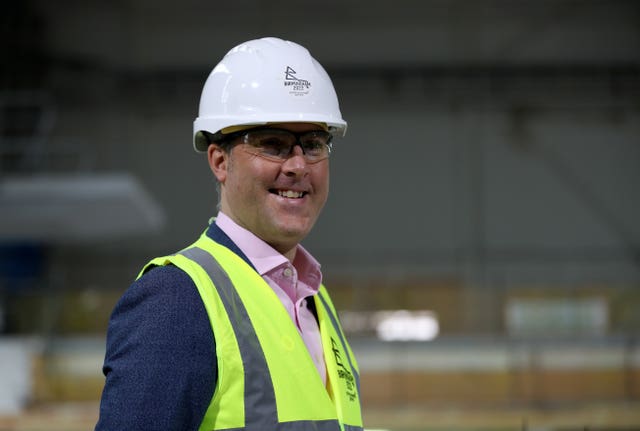Birmingham Commonwealth Games tickets back on sale with 100 days to go
The Games this summer are set to be a celebration free from Covid restrictions.

Birmingham and the West Midlands will be “buzzing” in 100 days’ time as the “biggest, boldest” Commonwealth Games get under way, its chief executive has said as tickets were set to go back on sale.
This summer’s event, which runs from July 28 to August 8, is set to be the first major multi-sports event to take place free of any Covid-19 restrictions.
The pandemic made an already shortened run-in time to the Games even more challenging for Birmingham 2022 chief executive Ian Reid and his team, but now the Scot believes it brings an extra excitement and spotlight to the region.
“I think hopefully in 100 days’ time, we’re about to put on what might be one of the first multi-sport events in the world where we do have full stadia, where we do have live sites and the city absolutely buzzing,” Reid told the PA news agency.
“The spotlight of the world will be on Birmingham and the West Midlands in that context. So perhaps it’s going to bring even further engagement with the event than perhaps we would have had pre-pandemic.”
The pandemic forced organisers to drop plans for an athletes’ village in Perry Barr to house 6,500 competitors, who will now be split over three existing sites at the universities of Birmingham and Warwick and the NEC.
“It’s a little bit more difficult for teams in managing (the athletes) but there is a lot of upside from a performance perspective,” Reid said.
“A lot of our athletes now are staying in a village that’s very close to both their training and their competition venues. If you’re staying at the University of Birmingham, squash is there, hockey is there, cricket is just next door.

“If you’re staying at the NEC, five of our sports are right on your doorstep. You can literally walk to your training and to competition. A lot (of athletes) have welcomed that.”
Reid is pleased the redevelopment at Perry Barr to create 5,000 new homes as part of the Games’ legacy will still go ahead as originally planned.
“I thought it was a much safer option to focus on the village as a legacy, make sure the community get the benefits that we committed to at the start, but give the athletes certainty,” he said.
Reid is encouraged that ticket sales for Birmingham are ahead of where the previous two Games – Gold Coast and Glasgow – were at the same stage.
“That fills us with great confidence because both those events (ultimately) sold well over 90 per cent of their tickets,” said Reid, who was the chief financial officer for the 2014 Glasgow Games organising committee.
Tickets go back on sale on Tuesday on the Games’ official website – the final major release.
Birmingham is likely to be the last Commonwealth Games of its kind, with the Commonwealth Games Federation’s new roadmap offering greater flexibility to hosts on the number and type of sports they include.
While Reid believes those changes are welcome, he feels Birmingham is well equipped to host under the ‘old’ model, and insists the two major capital projects – the redevelopment of the Alexander Stadium, which will host athletics, and the new-build Sandwell Aquatics Centre – will be valuable community assets.
“They have both been delivered against the clock and in tough circumstances,” Reid said.
“Sandwell Aquatics Centre, I think in terms of a legacy, is genuinely built for the community and adapted for the Games, not the other way around.”
The Games have benefited from £778m of central and local government funding, and Reid is proud of how organisers have stayed within the original framework despite the challenges posed by Covid.
He takes the most pride in the resilience of his team amid the pandemic, and in Birmingham being the “most inclusive” Games to date.
“When we went into lockdown one, we had 70 staff and we came out of that first lockdown with 480,” he recalls.
“So that gives you a sense of some of the people challenges – finding people, inducting them remotely, getting them an understanding of what we’re trying to achieve and the culture of the business, all that was quite different as well.
“The whole general COVID overlay and trying to plan ahead in terms of testing programmes, vaccination policies, communicating with teams when you’re not quite sure what the landscape is going to be like here in the UK or internationally, all of that has brought additional cost, it’s brought additional complexity, it’s brought uncertainty.
“But at the same time, I think it’s also brought opportunity. We’ve got a team who have been through all of that and it’s made us much more resilient.
“We’ve got in my view, the biggest, boldest Commonwealth Games. We’ve got the most inclusive Commonwealth Games which gives me great pride, more medals for female athletes and the largest Para programme. We’ve got an incredible cultural programme.
“But I’m perhaps most proud of the team and the partnership. Everyone has stepped up to the plate and given much more than we would have originally asked them on this project.”





